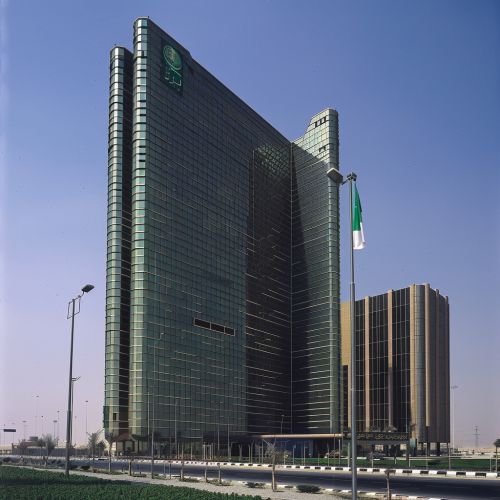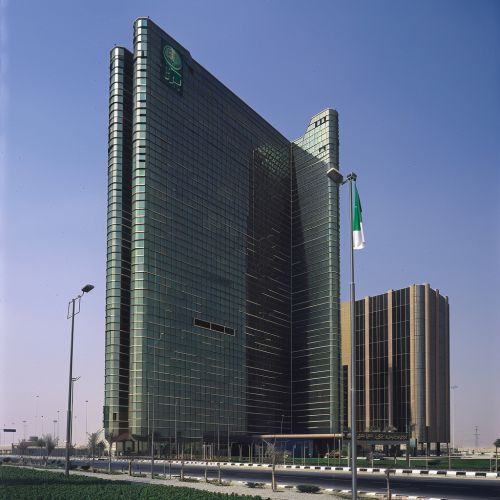Arabian-American Oil Company
History
The Arabian-American Oil Company, commonly known as Aramco, is a Saudi Arabian national petroleum and natural gas company. Originally established in 1933 as a partnership between the Kingdom of Saudi Arabia and the Standard Oil Company of California (SOCAL), Aramco has grown to become one of the largest and most influential energy companies in the world.
Early Years
The origins of Aramco can be traced back to the early 20th century when the global demand for oil began to surge. In 1933, SOCAL signed a concession agreement with the Saudi government, granting it the exclusive rights to explore and extract oil in the eastern region of the country. This agreement marked the beginning of a long and complex relationship between the United States and Saudi Arabia.


In 1938, after several years of exploration, oil was discovered in commercial quantities at the Dammam No. 7 well. This discovery marked a significant turning point for both the company and the Kingdom of Saudi Arabia, transforming the region into a major player in the global oil industry.
Expansion and Development
Throughout the 1940s and 1950s, Aramco expanded its operations significantly. The company built extensive infrastructure, including pipelines, refineries, and ports, to support its growing production capacity. The Trans-Arabian Pipeline (Tapline), completed in 1950, was a major engineering feat, transporting oil from the eastern province of Saudi Arabia to the Mediterranean Sea.
In 1948, SOCAL's interest in Aramco was joined by other American oil giants, including Standard Oil of New Jersey (now ExxonMobil), Standard Oil of New York (now Mobil), and Texaco. This consortium of American companies held a 100% stake in Aramco until the 1970s.
Nationalization
The 1970s were a period of significant change for Aramco and the global oil industry. In response to rising nationalism and the desire for greater control over natural resources, the Saudi government began to assert more control over Aramco. In 1973, the Saudi government acquired a 25% stake in the company, which was gradually increased to 60% by 1974. By 1980, the Saudi government had acquired full ownership of Aramco, transforming it into a state-owned enterprise.
Operations
Aramco's operations span the entire hydrocarbon value chain, from exploration and production to refining, distribution, and marketing. The company's vast reserves and advanced technological capabilities have positioned it as a leader in the global energy market.
Exploration and Production
Aramco's exploration and production activities are concentrated in the Eastern Province of Saudi Arabia, home to some of the world's largest and most prolific oil fields. The Ghawar Field, the world's largest onshore oil field, and the Safaniya Field, the world's largest offshore oil field, are key assets in Aramco's portfolio.
The company employs advanced technologies, such as 3D seismic imaging and horizontal drilling, to maximize the efficiency and productivity of its operations. Aramco's commitment to innovation and technological excellence has enabled it to maintain low production costs and high recovery rates.
Refining and Petrochemicals
Aramco operates a network of refineries and petrochemical plants both within Saudi Arabia and internationally. The company's refining capacity exceeds 5 million barrels per day, making it one of the largest refiners in the world. Key refining assets include the Ras Tanura Refinery, the largest in Saudi Arabia, and the SATORP Refinery, a joint venture with Total in Jubail.
In addition to refining, Aramco has a significant presence in the petrochemical industry. The company produces a wide range of petrochemical products, including ethylene, propylene, and various polymers, which are used in the production of plastics, synthetic fibers, and other industrial materials.
Distribution and Marketing
Aramco's distribution and marketing operations ensure the efficient and reliable delivery of petroleum products to customers around the world. The company operates a vast network of pipelines, storage facilities, and terminals to support its global supply chain.
Aramco's marketing strategy focuses on building long-term relationships with customers and partners, ensuring a stable and secure supply of energy. The company's customer base includes major international oil companies, national oil companies, and independent refiners.
Technological Innovation
Aramco has a long-standing commitment to technological innovation and research and development (R&D). The company's R&D efforts are focused on enhancing the efficiency and sustainability of its operations, as well as developing new technologies to address the challenges of the energy transition.
Advanced Technologies
Aramco invests heavily in advanced technologies to optimize its exploration, production, and refining processes. Key areas of focus include:
- Enhanced Oil Recovery (EOR): Techniques such as carbon dioxide injection and chemical flooding are used to increase the amount of oil that can be extracted from mature fields.
- Digital Transformation: The integration of digital technologies, such as artificial intelligence (AI), big data analytics, and the Internet of Things (IoT), to improve operational efficiency and decision-making.
- Renewable Energy: Research and development of renewable energy technologies, including solar and wind power, to diversify the company's energy portfolio and reduce its carbon footprint.
Research Centers
Aramco operates several research centers around the world, including the Aramco Research Center in Dhahran, the Aramco Research Center in Houston, and the Aramco Research Center in Beijing. These centers collaborate with leading universities, research institutions, and industry partners to advance the company's technological capabilities.
Environmental and Social Responsibility
Aramco is committed to environmental stewardship and social responsibility. The company has implemented a range of initiatives to minimize its environmental impact and contribute to the sustainable development of the communities in which it operates.
Environmental Initiatives
Aramco's environmental initiatives focus on reducing greenhouse gas emissions, conserving water, and protecting biodiversity. Key programs include:
- Carbon Management: Efforts to reduce carbon emissions through energy efficiency measures, carbon capture and storage (CCS) technologies, and the development of low-carbon fuels.
- Water Conservation: Initiatives to reduce water consumption and increase the use of recycled water in industrial processes.
- Biodiversity Protection: Programs to protect and restore natural habitats, including mangrove forests, coral reefs, and desert ecosystems.
Social Responsibility
Aramco's social responsibility programs aim to improve the quality of life for communities in Saudi Arabia and beyond. Key areas of focus include:
- Education and Training: Investment in education and vocational training programs to develop the skills and capabilities of the local workforce.
- Health and Safety: Initiatives to promote health and safety in the workplace and in the communities where Aramco operates.
- Economic Development: Support for small and medium-sized enterprises (SMEs) and local suppliers to stimulate economic growth and diversification.
Corporate Governance
Aramco's corporate governance framework is designed to ensure transparency, accountability, and ethical conduct. The company's governance structure includes a Board of Directors, executive management team, and various committees responsible for overseeing key aspects of the business.
Board of Directors
Aramco's Board of Directors is responsible for providing strategic direction and oversight of the company's operations. The Board is composed of members with diverse backgrounds and expertise, including representatives from the Saudi government and independent directors.
Executive Management
The executive management team is responsible for the day-to-day operations of the company. The team is led by the President and CEO, who is supported by a group of senior executives with expertise in various areas of the business.
Committees
Aramco has established several committees to oversee specific aspects of its operations, including the Audit Committee, the Risk and Compliance Committee, and the Compensation Committee. These committees play a critical role in ensuring that the company adheres to best practices in corporate governance.
Financial Performance
Aramco is one of the most profitable companies in the world, with significant revenues and earnings driven by its vast oil and gas reserves. The company's financial performance is closely monitored by investors, analysts, and industry observers.
Revenue and Earnings
Aramco's revenue is primarily generated from the sale of crude oil, natural gas, and refined products. The company's earnings are influenced by a range of factors, including global oil prices, production levels, and operating costs.
In recent years, Aramco has reported strong financial performance, with revenues exceeding $300 billion and net income of over $100 billion. The company's profitability is supported by its low production costs and efficient operations.
Capital Expenditure
Aramco invests heavily in capital projects to expand its production capacity, enhance its refining capabilities, and develop new technologies. The company's capital expenditure budget is among the largest in the industry, reflecting its commitment to long-term growth and sustainability.
Key capital projects include the development of new oil and gas fields, the expansion of refining and petrochemical facilities, and investments in renewable energy and advanced technologies.
Global Impact
Aramco's influence extends beyond Saudi Arabia, with a significant impact on the global energy market and international relations.
Energy Market
As the world's largest oil producer, Aramco plays a critical role in shaping global energy markets. The company's production decisions and investment strategies have a significant impact on oil prices and supply dynamics.
Aramco's ability to maintain stable and reliable production levels is essential for ensuring energy security and meeting the growing demand for oil and gas worldwide.
International Relations
Aramco's operations and partnerships have significant geopolitical implications. The company's relationships with major oil-consuming countries, such as the United States, China, and India, are critical for maintaining global energy stability.
Aramco's investments in international projects and joint ventures also contribute to strengthening economic ties and fostering cooperation between Saudi Arabia and other countries.
Future Outlook
Aramco's future outlook is shaped by a range of factors, including global energy demand, technological advancements, and environmental considerations.
Energy Transition
The global energy transition presents both challenges and opportunities for Aramco. The company is actively exploring ways to diversify its energy portfolio and reduce its carbon footprint, while continuing to meet the world's growing demand for oil and gas.
Aramco's investments in renewable energy, carbon capture and storage, and advanced technologies are key components of its strategy to navigate the energy transition and ensure long-term sustainability.
Innovation and Growth
Aramco's commitment to innovation and growth remains a cornerstone of its business strategy. The company is focused on enhancing its technological capabilities, expanding its production capacity, and exploring new markets and opportunities.
Aramco's ability to adapt to changing market conditions and leverage its strengths will be critical for maintaining its leadership position in the global energy industry.
